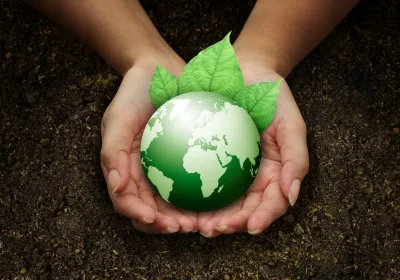
Organic Farming and Organic Eating
Organic farming embraces the concepts of respect for the soil and the environment, nutrient-dense produce, balance, biodiversity, and quality of life for livestock. Organic farming assumes that if the soil is healthy, then the plants it produces will be healthy and the people and animals eating the plants will be healthy, too. Organic farming works with nature rather than against it.
Contrast the organic farming philosophy with the reductionist theories of modern agriculture, which assumes that all a plant needs is an application of N-P-K (nitrogen, phosphorous, and potassium), artificial insecticides, herbicides, fungicides, and pesticides, and all will be well. This completely ignores the fact that there are complex microorganisms and processes in nature we do not yet fully understand. These complexities contribute to soil and plant health, which ultimately enhance human health. Equally disturbing is the necessity for agribusiness to constantly increase the amount of fertilizers used and strengthen their control mechanisms to bolster ailing soil and ward off pests. It is an escalating war that cannot be won.
Organic Farming Challenges The Myth of Food Shortage
Abraham Maslow once said, “If you only have a hammer, you tend to see every problem as a nail.” He may well have been speaking about modern commercial agriculture, which uses manufactured substances in an attempt to bully nature into submission. Nature, however, will not be bullied. It is pure hubris to think we can outwit, outplay, and outlast Mother Nature.
The sad fact is commercial agriculture is not driven by health concerns but by profits. Those who argue against organic farming methods often cite the need to increase food production to feed the millions who go hungry each day. It is a myth that there is not enough food to go around. There is, in fact, a glut, and tons of food are dumped or stockpiled annually to artificially maintain prices.
Organic Farming vs Commercial Agriculture: The Price Debate
Pound for pound, organic food is generally more expensive than commercial food. We must weigh this fact against the long-term costs of unsustainable farming practices—including the poisoning of groundwater from runoff and the depletion of our precious soil through erosion and overuse.
It’s hard to argue the benefits of organic produce when some still believe there is no discernible taste or visual difference between it and commercially grown food. One look at an organic egg from a free-range chicken, however, is enough to convince even the most hardened skeptic. The yolk is a vital, sunshine yellow, and the shell does not disintegrate in a mushy pile. You know when you taste an organic egg that you’re eating a nutritious egg from a healthy, happy chicken.
We live in a sea of chemicals, and while the human body makes heroic attempts to process the onslaught, the rise of diseases attests to the fact that something is terribly amiss. From the antibiotics routinely fed to factory-farmed animals to the slew of chemicals in processed and denatured food, we regularly consume massive quantities of unnatural ingredients. Eating organically farmed foods is one way for us to make a healthier choice for ourselves and our world.
Eating Organic Food and Your Love For the Earth
Eating organic food moves beyond mere taste and appearance. Organic food is “real” food and exhibits a vitality absent from commercially produced crops. Food grown in living, vibrant soil contains more vitamins, minerals, micro-nutrients, life force, and energy. When you eat organic food, you are absorbing a whole array of wholesome goodies—as opposed to empty calories—presented in a package that is as near as possible to what nature intended.
There’s nothing quite like purchasing organic food from a local farmer’s market. Thankfully, due to consumer demand, they are springing up everywhere. The variety is remarkable, and the produce is fresh, minimally packaged and transported, and free from irradiation and window dressing. An organic tomato is indeed a tomato, picked ripe and ready to eat.
Organic farmers are impassioned advocates of the earth and her resources. When you buy organic, you are not only choosing to eat better, cleaner, and more nutritious food, but you are also contributing to the responsible stewardship of our fragile and exquisite planet.

